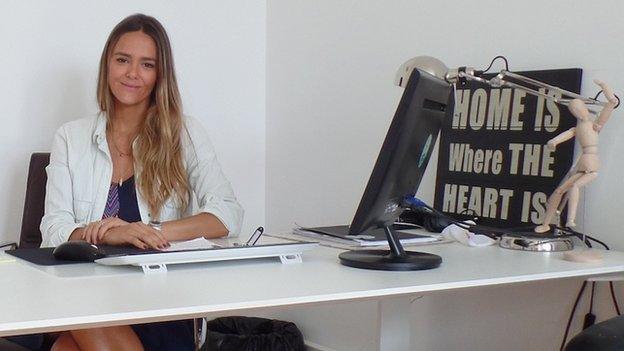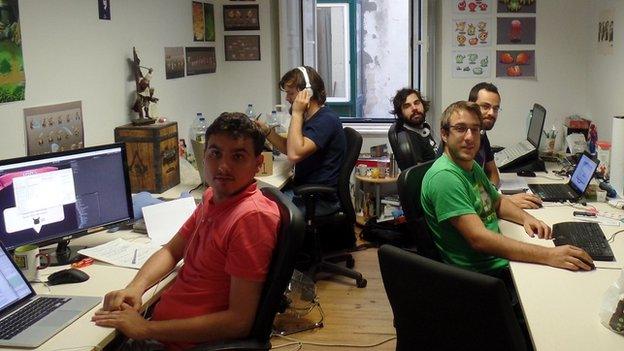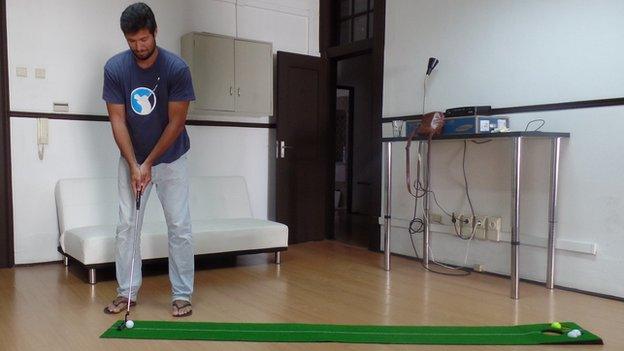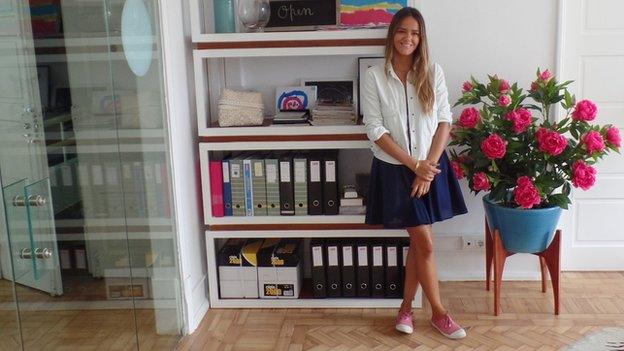Portugal's growing number of young entrepreneurs
- Published

Magda Tilli and her husband run an estate agency specialising in rental properties
When Portugal was hit by an economic crisis in 2011, Magda Tilli and her husband Miguel realised that if they wanted to make a decent living they would have to set up their own business.
At the time Mr Tilli was working as an estate agent, but with the Portuguese housing market in free fall, he was earning next to nothing.
And with Portugal's government needing a 78bn euro ($103bn; £62bn) international bailout, in exchange for putting in place a number of austerity measures, the wider Portuguese economy was mired in its worst recession for more than 40 years.
With the jobs market having ground to a halt, and four children to look after, Magda and Miguel Tilli decided they had no option but to take a chance on starting their own company.
Ms Tilli, 37, recalls: "We were at the beach, brainstorming about what we could do."
Tapping into Mr Tilli's knowledge of the property market, they recognised that they could turn a problem - no one was buying homes anymore - into a business opportunity.
And so, they decided to launch an estate agent business specialising in renting houses in Lisbon city centre.
While such a focus on rental properties may be common in other countries, the great majority of Portuguese estate agents only deal with selling homes.
This is because in Portugal owning your own house or apartment has always been such a matter of pride that it is the first choice of most people, even young adults.

Commentators say that Portugal has never had more would-be young entrepreneurs
Yet suddenly the great majority of young people couldn't hope to get a mortgage. Instead, a growing number living in Lisbon started to turn to the Tillis' new property rental business - Home Lovers.
To keep start-up costs down, the couple initially listed their available properties only on Facebook.
Yet to build up a decent reputation, they hired professionals to take all the photos, and only accepted properties of a high standard.
Ms Tilli says they picked the kind of places that appeal to young, urban professionals, such as trendy apartments.
Soon they had a steady stream of customers, both people wishing to rent a property, and landlords wanting to list with them.
"It became a cool thing to rent a house through us," says Ms Tilli, who previously worked as a flight attendant for TAP, the main Portuguese airline.
Home Lovers has now expanded to Porto and Cascais, two other Portuguese cities, and has a team of 20 workers.
It is now considering going to Madrid.

The Portuguese economy remains weak despite coming out of recession last year
Ms Tilli says: "I'm a bit scared with that, but I don't see us being able to do this in any more places here in Portugal."
'Wannabe entrepreneurs'
To understand why entrepreneurship, or setting up a business, is now so popular in Portugal, you only need a quick reminder of how bad unemployment remains in the country, even though it came out of recession in 2013.
The Portuguese jobless rate rose from 7.6% in 2008 to 14.1% in June of this year.

Anthony Douglas takes a break from work to practice his putting
The situation is even worse for young adults, with one out of every three people aged 15 to 24 years old out of work, according to Eurostat, the statistical office of the European Union.
Professor Paulo Soares de Pinho, who teaches at Nova School of Business and Economics in Lisbon, and runs his own investment fund, says that one of the biggest changes brought by Portugal's economic crisis was "to transform many unemployed people into wannabe entrepreneurs".
Yet he cautions that while many technology-minded young people are coming up with products, not all of them are able to turn them into a viable business.
"We're going through an app entrepreneurship wave. Any kid coming out of an engineering school develops an app and thinks he has a company," he says.
"But there are many tech projects with no market orientation whatsoever."
Carlos Silva, co-founder of the crowd funding website Seedrs, agrees that in Portugal "may start-ups are going ahead just because entrepreneurship is now a trend".

Hole19 has very much set its sights on the global golf market
Yet, he adds that there are "more and more start-ups of excellent quality."
To help boost entrepreneurship, the Portuguese government has created an investment body called Portugal Ventures to invest 20m euros of public funds a year into start-up firms.
Start-up incubators have also sprung up, to give new businesses an office or desk to help them get on their feet during their first months.
Magda and Miguel Tilli, used one such incubator - Start-up Lisboa - during the launch of their firm.
Business transformation
Anthony Douglas is another entrepreneur who has used Start-up Lisboa to get his business off the ground.
The 33-year-old is the founder of Hole19, a golfing app, which has mapped out thousands of golf courses around the world, and allows golfers to track and store statistics about their own performances.

Magda Tilli and her husband are now planning to turn their attention towards Madrid
Initially it was a paid app, and the business struggled.
Mr Douglas, who has a Portuguese mother and American father, says: "We've been almost dead a few times, with zero euros in the bank.
"In some months I stopped paying my own salary and had to ask relatives for money."
Yet Mr Douglas has since been able to transform the business's fortunes by giving the app away for free.
The aim is now to make money by enabling Hole19's users to book golf courses via the app, in exchange for paying a fee each time.
Mr Douglas says Hole19 was downloaded 220,000 times in the first 90 days after going free. And recently he raised 900,000 euros from foreign investors.
Joao Romao, 25, is another young Portuguese entrepreneur who has managed to turn around his business fortunes.
His first start-up venture, based around the idea of a shareable gift list connected to online shops, quickly failed.
Undeterred, he is now developing a business called GetSocial, which aims to help companies promote their content on social networks, and measure its impact.
Recently he secured 630,000 euros of investment.
Mr Romao says: "The first try was a good lesson learned. It taught me how to build a start-up. Everybody's learning."